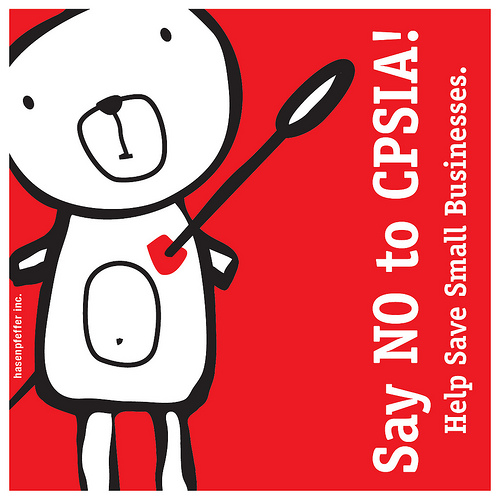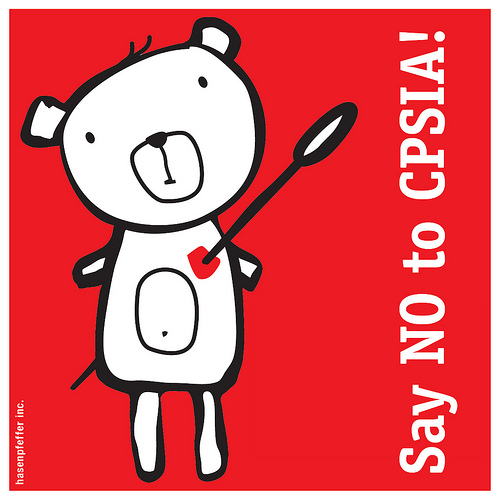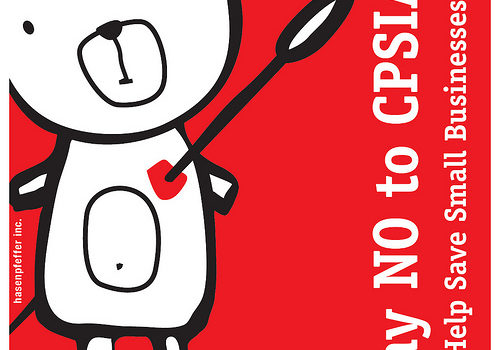A few nice china molds make maker images I found:
Speak Out Against CPSIA!

Image by Hasenpfeffer Incorporated
We make and sells dolls, teddy bears, and such. But this isn’t a plug for our business. As a reaction to the dangerous-toy scare last year, the Consumer Product Safety Commission created something called the Consumer Products Safety Improvement Act. It requires all manufacturers of children’s goods to submit their products for testing for lead and phthalates.
While that’s good in the overall scheme, it has some potentially damaging side effects. The problem is that the average testing fee runs a few thousand dollars. Making matters worse, we would have to submit each and every toy for testing since no two are alike (she makes her stuff from salvaged materials like old wool coats and such). Naturally you can see what this version of the act would do to the handmade toy and craft industry (it’s more than macramé owls nowadays).
There is a potential remedy, though. Below is the unabridged copy from the Handmade Handmade Toy Alliance. Below are links to a sample letter and to various legislators.
Save the USA from the CPSIA
In 2007, large toy manufacturers who outsource their production to China and other developing countries violated the public’s trust. They were selling toys with dangerously high lead content, toys with unsafe small part, toys with improperly secured and easily swallowed small magnets, and toys made from chemicals that made kids sick. Almost every problem toy in 2007 was made in China.
The United States Congress rightly recognized that the Consumer Products Safety Commission (CPSC) lacked the authority and staffing to prevent dangerous toys from being imported into the US. So it passed the Consumer Product Safety Improvement Act (CPSIA) in August, 2008. Among other things, the CPSIA bans lead and phthalates in toys, mandates third-party testing and certification for all toys and requires toy makers to permanently label each toy with a date and batch number.
All of these changes will be fairly easy for large, multinational toy manufacturers to comply with. Large manufacturers who make thousands of units of each toy have very little incremental cost to pay for testing and update their molds to include batch labels.
For small American, Canadian, and European toymakers, however, the costs of mandatroy testing will likely drive them out of business.
* A toymaker, for example, who makes wooden cars in his garage in Maine to supplement his income cannot afford the ,000 fee per toy that testing labs are charging to assure compliance with the CPSIA.
* A work at home mom in Minnesota who makes dolls to sell at craft fairs must choose either to violate the law or cease operations.
* A small toy retailer in Vermont who imports wooden toys from Europe, which has long had stringent toy safety standards, must now pay for testing on every toy they import.
* And even the handful of larger toy makers who still employ workers in the United States face increased costs to comply with the CPSIA, even though American-made toys had nothing to do with the toy safety problems of 2007.
The CPSIA simply forgot to exclude the class of toys that have earned and kept the public’s trust: Toys made in the US, Canada, and Europe. The result, unless the law is modified, is that handmade toys will no longer be legal in the US.
If this law had been applied to the food industry, every farmers market in the country would be forced to close while Kraft and Dole prospered.
How You can Help:
Please write to your United States Congress Person and Senator to request changes in the CPSIA to save handmade toys. Use our sample letter or write your own. You can find your Congress Person here and Senator here.
Thank you so much!
Spread the Word! – Save Jobs.

Image by Hasenpfeffer Incorporated
We make and sells dolls, teddy bears, and such. But this isn’t a plug for our business. As a reaction to the dangerous-toy scare last year, the Consumer Product Safety Commission created something called the Consumer Products Safety Improvement Act. It requires all manufacturers of children’s goods to submit their products for testing for lead and phthalates.
While that’s good in the overall scheme, it has some potentially damaging side effects. The problem is that the average testing fee runs a few thousand dollars. Making matters worse, we would have to submit each and every toy for testing since no two are alike (she makes her stuff from salvaged materials like old wool coats and such). Naturally you can see what this version of the act would do to the handmade toy and craft industry (it’s more than macramé owls nowadays).
There is a potential remedy, though. Below is the unabridged copy from the Handmade Handmade Toy Alliance. Below are links to a sample letter and to various legislators.
Save the USA from the CPSIA
In 2007, large toy manufacturers who outsource their production to China and other developing countries violated the public’s trust. They were selling toys with dangerously high lead content, toys with unsafe small part, toys with improperly secured and easily swallowed small magnets, and toys made from chemicals that made kids sick. Almost every problem toy in 2007 was made in China.
The United States Congress rightly recognized that the Consumer Products Safety Commission (CPSC) lacked the authority and staffing to prevent dangerous toys from being imported into the US. So it passed the Consumer Product Safety Improvement Act (CPSIA) in August, 2008. Among other things, the CPSIA bans lead and phthalates in toys, mandates third-party testing and certification for all toys and requires toy makers to permanently label each toy with a date and batch number.
All of these changes will be fairly easy for large, multinational toy manufacturers to comply with. Large manufacturers who make thousands of units of each toy have very little incremental cost to pay for testing and update their molds to include batch labels.
For small American, Canadian, and European toymakers, however, the costs of mandatroy testing will likely drive them out of business.
* A toymaker, for example, who makes wooden cars in his garage in Maine to supplement his income cannot afford the ,000 fee per toy that testing labs are charging to assure compliance with the CPSIA.
* A work at home mom in Minnesota who makes dolls to sell at craft fairs must choose either to violate the law or cease operations.
* A small toy retailer in Vermont who imports wooden toys from Europe, which has long had stringent toy safety standards, must now pay for testing on every toy they import.
* And even the handful of larger toy makers who still employ workers in the United States face increased costs to comply with the CPSIA, even though American-made toys had nothing to do with the toy safety problems of 2007.
The CPSIA simply forgot to exclude the class of toys that have earned and kept the public’s trust: Toys made in the US, Canada, and Europe. The result, unless the law is modified, is that handmade toys will no longer be legal in the US.
If this law had been applied to the food industry, every farmers market in the country would be forced to close while Kraft and Dole prospered.
How You can Help:
Please write to your United States Congress Person and Senator to request changes in the CPSIA to save handmade toys. Use our sample letter or write your own. You can find your Congress Person here and Senator here.
Thank you so much!
